|
This area contains information about specific SFF Alumni. Find profiles, significant events,
and keep up to date on your fellow members. We also have links to members' personal web sites. Contact
us with questions.
Michael Madsen - Actor
At 6' 2" and 190 pounds, Michael Madsen - the brother of actress Virginia Madsen - is equally adept at portraying heroic as well as villainous characters. There's just something in the
way he delivers his lines with an underlying aggression masked behind his gravelly tones that makes you feel very uneasy about
his true intentions! Madsen first learned his craft at Chicago's Steppenwolf Theatre, where he worked under John Malkovich, one of the theater's founders.

His first few film roles were minor ones, in such projects as Against All Hope (1982), Racing with the Moon (1984) and The Natural (1984). His work received considerable notice, however, after his knife-edged performance as deranged
killer Vince Miller in Kill Me Again (1989) and then as Susan Sarandon's rough-edged boyfriend Jimmy in Thelma & Louise ( 1991). His big breakthrough, however, came as the sadistic jewel thief Mr. Blonde in Quentin Tarantino's low-budget hit Reservoir Dogs (1992). Movie audiences were glued to their seats as Madsen playfully danced around a tied-down and terrified
police officer, slicing him with a knife and splashing gasoline all over the petrified man, all to the cheery tunes of "Stealer's
Wheels' "Stuck In the Middle With You."

Not to be typecast, Madsen surprised many with his performance as foster parent Glen Greenwood in
the hit family movie Free Willy (1993) before returning to another criminal role as bank robber Rudy Travis in the remake of the
Steve McQueen heist flick The Getaway (1994), and then back again as Glen Greenwood in Free Willy 2: The Adventure Home (1995). Madsen continues to turn in edge-of-the-seat performances as morally bankrupt individuals on
the wrong side of the law, as in his intense on-screen showings in Donnie Brasco (1997), Mulholland Falls (1996), and High Noon (2000) (TV). In 2003 he teamed up again with Tarantino in both "volumes" of
Tarantino's magnum martial arts/revenge opus Kill Bill: Vol. 1 (2003) and Kill Bill: Vol. 2 (2004) as the coldly evil Budd (aka "Sidewinder").

In addition to his film work, Madsen has contributed dialogue to two of Sony PlayStations's biggest-selling
games, Grand Theft Auto III ( 2001) (VG) as well as writing several books of his own poetry. Although uncomfortable with fame, Madsen's
star continues to shine in Hollywood and his droll, yet captivating acting style is ensuring him a steady flow of work as
one on the screen's favorite "heavies".
Stefan Fangmeier
In addition to supervising and/or contributing the visual effects for ILM's amazing films like "Saving
Private Ryan", "Master and Commander", "The Bourne Identity" and "The Perfect Storm", Stefan has become a major film
director.
In 2006 he helmed Fox's multi-million dollar smash hit, "Eragon" which immediately catipulted Stefan
into a new stratosphere.
Now Stefan has added to his resume working with amazing actors like Jeremy Irons and John Malkovich.
In addition he's worked on a huge production spanning several different countries. Not bad we'd say. Norcal film is proud
to call Stefan Fengmeier a friend and member for life.
 John Daly - John Daly -
Visionary Spirit winner 2005
Producer John Daly stood behind many big-budgeted independent films
of the '80s and '90s and sustained a reputation as a successful risk-taker in a traditionally conservative Hollywood. Though
considered a maverick by many moguls given his willingness to back films that the big studios wouldn't touch, Daly remained
a savvy businessman with a sharp eye for moneymakers. Born in London in 1936, as the son of a cockney dockworker. Daly got
his start working as a teaboy and later as a waiter in the Merchant Navy and as an insurance salesman. He met David Hemmings
and the two founded the Hemdale Company in 1966, as a talent agency that repped bands including Black Sabbath and Yes.

Daly's career focus shifted somewhat in 1971, however, when he purchased
Hemmings's share of the business and used it to form his own production company, Hemdale Group Ltd; under Daly's aegis, it
blossomed into one of the leading "indie" production and distribution houses in the UK. He demonstrated an astonishing, almost
visionary skill as a moviemaker, and unveiled a predilection for standing behind directors in whom he believed - including
Robert Altman (with the 1972 Images), Ken Russell (with the 1975 Tommy), Bernardo Bertolucci (with the 1987 Best Picture winner
The Last Emperor) , James Cameron (with the 1984 Terminator), and Oliver Stone (with the twin 1986 releases Salvador and Platoon,
the latter also a Best Picture winner).
The company occasionally issued excellent films that turned into box-office
disappointments as well (witness the 1981 Cattle Annie and Little Britches), but these marked exceptions and not the rule;
at the time of Daly's death, the press marked that he had overseen the production of more than 100 titles at Hemdale, grossing
in excess of $1.5 billion - a whopping sum for an independent production house.
From the late 1980s into mid-1990s, Hemdale's output remained prolific,
though in 1995 Orion purchased the studio (by then renamed Hemdale Communications) and its assets. Daly's filmmaking efforts
continued, but witnessed him branching out into scriptwriting and directing in addition to producing; he held down all three
roles on the romantic adventure/political drama The Petersburg-Cannes Express (2003) and the period psychological drama The
Aryan Couple (2004), the latter starring Martin Landau and had it's NorCal premiere at The Sacramento Film Festival. Couple
- the tale of Jewish husband and wife servants posing as Aryans during the Nazi regime, who conceive of a plan to extinguish
Eichmann and Himmler - received mediocre stateside reviews but did pick up a number of international festival awards. Sadly,
this marked one of Daly's last major efforts and he died of cancer at age 71 in October of 2008. (bio by hollywood.com)
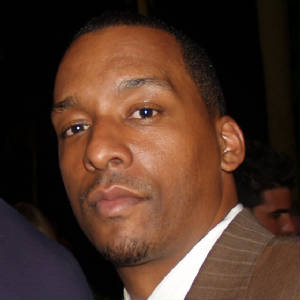
|
| Deon Taylor; Entrepeneuer, Filmmaker, Renaissance Man |
Deon Taylor; Renaissance Man
With two reality shows currently in the works and two theatrical releases scheduled,
writer and producer Deon Taylor is considered one of the industry's hottest new talents.
He is one of the duo behind
Hooks and Taylor Entertainment, a self-contained production company transforming low budget films into multi million dollar
ventures.
His feature films include "7eventy5ive,"
starring Rutger Hauer which was premiered by Northern California Film Foundation and The Sacramento
Film Festival . Also, in 2008, we premiered "The Hustle" Deon's latest, a comedy starring Charlie Murphy and filmed entirely in Sacramento. Taylor is now working on the sports drama "Free
Agents."
Taylor's creativity is also hitting the screen in the television genre. "The Garage," described
as "Cribs meets Pimp My Ride," will bring the viewer into the well-stocked garages of today's top entertainers and athletes.
Another project, "Night Tales" stars Flavor Flav as an urban version
of the Cript Keeper" and features our own Diana Irwin as a screenwriter. Many episodes are in the
can and the show is currently searching TV distribution. www.hooksandtaylor.com.
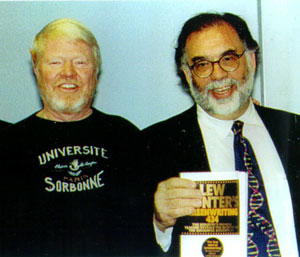
|
| Lew Hunter (left) with Francis Copolla |
Lew Hunter; GodFather of American Screenwriting by Sally J. Walker
Lew Hunter has been a "name" in the Hollywood writing
community and television for over 40 years. A past chair of the Film Department at UCLA, his title there is the retired Professor
and Film Chair Emeritus. SCREENWRITING 434 is the title of his revered textbook. His students have created such well known
movies as "Highlander, The Movie" (Gregory Widen) and "About Schmidt"
(Oscar winner Alexander Payne). His writing colonies offered in Nebraska and around the world are currently motivating wave after wave of ambitious, talented writers.
His second book, NAKED SCREENWRITING: INTERVIEWS 20 ACADEMY AWARD-WINNING
DIRECTORS AND WRITERS.
His first writing break came in 1969 when he sold and
Aaron Spelling produced "If Tomorrow Comes" and earned his WGA membership card.
Lew went on to work with such iconic writers as Paddy Chaefsky, Larry Gelbart, Neil Simon and Ray
Bradbury. His MOW, "Fallen Angel," received a 1981 Emmy nomination and multiple national
and international awards.
This astute man built on his hard-earned insights as he moved
up the administrative ladder of the industry working with Walt Disney studios and the major networks. He served as
Program Director for NBC from 1973 to 1977, supervising classic series like
"Batman," "Bewitched," "The Adams Family,"... well, almost the entire present-day
Nick-At-Night schedule. For more on Lew Hunter go to: www.lewhunter.com
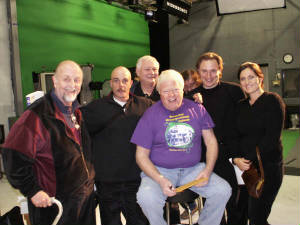
|
| Dr. Lew Hunter and Cal Film members |
Why Join California Film?
There are many film groups now days. If you want to sit and have tea, discuss movies or meet
a few novice filmmakers there are many options. But if you want to learn from the brightest and the best, come to Cal Film!
Together with our partner, The Sacramento Fim Festival (T.M.), We have
featured more top drawer talent and more exclusive premieres of top names than any other group in our region. If you live
in the foothills, Davis, Stockton or surrounding areas and are weighing wether to come out, let us suggest this: You won't
meet these incredible talents sitting home and you won't learn more about your craft working on your car on Friday night.
So come and see us. We'll entertain you, feed you, and in the immortal words of Fat Albert "if your not too careful, you might learn a thing or two".
|
 |
|
|
|
 |
 |
|
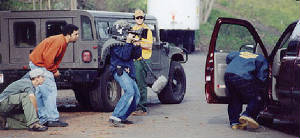
|
| Production still from Fugitive Hunter |
Filmmakers! California Film members enjoy the following benefits:
- Monthly meetings
- Professional networking with industry
- Special guest speakers
- Professional development seminars and workshops
- Discounts to special events (i.e. film festivals etc.)
- and much, much more!
Become a member: www.Californiafilm.net
John Walker
Winner of the British Academy Award (the Bafta) John Walker has gone from Northern
California to Hollywood and the top of the entertainment industry box office with major hits such as ‘The
Incredibles’, ‘Osmosis Jones’ and ‘The Iron
Giant’ and 'Ratatouille'.
In addition to John’s Pixar work, he is currently developing live action projects on a
strictly INDIE basis, here in Northern California. As a guest of the Sacramento Film Festival and Norcal filmmaker in his
own right, John knows what it takes to make it as a filmmaker today and give us a peek at Norcal success.
Joe Carnahan
If you read the official bio on Joe Carnahan it will probably tell you how he began
his career freelancing for ESPN and FOX SPORTS. It will also chronicle how he went on to become the writer director of
such hits as NARC with Jason Patrck and Ray Liotta and SMOKIN ACES with Ben Affleck, Ryan Renolds and a host of Hollywood
heavyweights.
What your not likely to hear is that as a Community Producer/intern at Access
Sacramento, Joe cut his teeth on little direct-to-tape movies projects while honing his craft at Sac State and as a frequent
participant of this organization. Or, how, While working as an editor at Sac's Channel 31, Carnahan wrote and directed his
first feature, Blood Guts, Bullets and Octane which was screened at the Sacramento Festival
of Cinema.
In 2007 of this year SFF and Norcal film co-sponsored the SMOKIN
ACES World Premiere. The star-studded event featured a performance by rapper Common
and visits from the film's star, Jeremy Piven and Sacramento's own Chris
Holley (also a member of California Film). What's next for this prolific filmmaker?
Stay tuned!
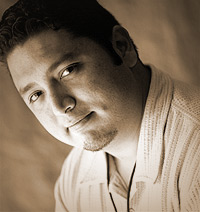
|
| Director Alexander J. Jimenez |
Community Events
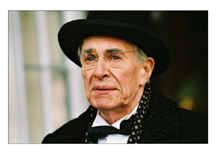
|
| Martin Landau starred in john Daly's The Aryan Couple in 2005 |
Community events are at the core of our success. Members get the chance to meet each other and network with folks like
the ones on this page, all of whom have spoken at SFF events.
Please make plans to join us for an upcoming event soon!

JOHN OTTMAN - Composer, Editor
From an early age in San Jose, California, John Ottman began writing and recording radio plays on cassette
tapes.
USC film school became his big stop, where, after already having been a veteran of numerous Super-8
films, the film he worked on, "Summer Rain", ended up winning the Student Academy Award. On that film, a production assistant named Bryan Singer noticed what John had done, and befriended him.
On Singer's first feature, Public Access, John edited the picture for three months in the evenings and weekends while at his job at Promax. His
effective sequences and editorial montages became the highlight of the picture. Additionally in the eleventh hour, the film
lost its composer, and John's time had come. After having heard John's early work, and sensing his passion for scoring the
film he had created in the editing room, Singer (leerily) asked Ottman to write the score. Public Access received the
Grand Jury Prize at the 1993 Sundance Film Festival, with the score and editing
being applauded in reviews. The synthesis John created between music and image had been born.
With The Usual Suspects, and all future Singer films, John held to his promise that, despite his scoring dreams, he would commit
to the months required to also edit Bryan's films. The Usual Suspects released him from his 9-5 job, (a whopping $1,000
a week for editing) and the leery producers gave the go-ahead to have him both edit and write the score for the complicated
picture. Through sound and picture montage, (edited in John's living room on an old Steinbeck flatbed machine and a splicer)
coupled with his musical vision, The Usual Suspects received widespread acclaim, invariably mentioning the romantic
score and inspired editing. John was nominated by the American Cinema Editors and
won the British Academy Awards for his editing, as well as a Saturn Award for his score to the film.
After Suspects, actor/director Ben Stiller hired John to score The Cable Guy, which was John's opportunity to weave in his distinctive style within a comedic context. Before The
Cable Guy was even done mixing, John was already hard at work writing a huge score for the film, Snow White: A Tale of Terror with Sigourney Weaver.
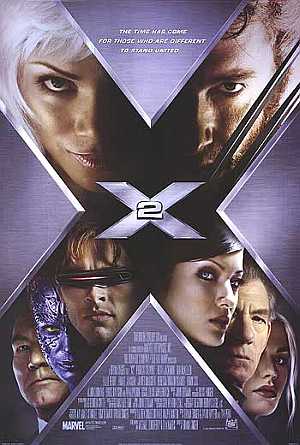
After scoring Lake Placid for the same studio, Phoenix productions approached John to direct
Urban Legends: Final Cut. Having planned to write his dream score for X-Men for
long-time collaborator Bryan Singer, Ottman was faced with a hard decision. But X-Men was scheduled for a December
2000 release and it was too early for them to hold John to the production which was phasing in and out of the green light/red
light status. When John signed to UL2, X-Men green-lit and later pushed their release to July 2000. The collision
of schedules pre-empted his scoring the film. Urban Legends: Final Cut marks yet another record-setting feat by Ottman.
This time he accomplished triple duties, stylishing directing, editing and also scoring a studio film, opening at number one
at the box office. He recorded the score with the Munich Symphony Orchestra.
Once every couple years, the overwhelming task of both editing and scoring a Bryan Singer film confronts
John. For X-Men 2, John did the job that took 5 editors on X-Men 1, and wrote the heralded score for
the picture. This was the first time John had tackled both tasks on such a monstrous production. There were about four weeks
for him to write 95 minutes of music for a 100 piece orchestra, as well as constantly being torn away from his writing to
attend to the myriad of editorial post-production duties as editor.
After X2, John took a break. Joel Silver found John for Gothika. It had been a few films since writing a horror score, so John was inspired by the material. When he
realized it was actually more a psychological story, he was even more excited by it and even did a 15 minute demo to picture
to get the job. With Gothika, there was no temp score, and John feverishly wrote the score as they would finish editing
each reel. He would then present his mock-ups of the score mixed in the Avid as the editor presented the reel to Joel Silver.
Joel got an opportunity to pre-view the actual score the same time he was seeing the cuts. This began a wonderful collaborative
relationship with Joel Silver.

Next was the action thriller, Cellular. Dean Devlin, who had hit it off with John on Eight Legged Freaks, was the producer. Cellular's
post production schedule got extended, so during that time John agreed to write the main theme to Imaginary Heroes, an independent film written and directed by X2 writer Dan Harris. There wasn't time to write
the score, so John's friend, Deborah Lurie, adapted his theme and scored the film. John then delivered a heart-stopping action
score for Cellular utilizing the full battery of the orchestra, as well as a creative use of electronic phone sounds woven
in the score. The most challenging part of the project was keeping an emotional connection between two main characters played
by Kim Bassinger and Chris Evans, who are never in the same space.
Before Cellular was finished, Joel Silver contracted John to score Kiss Kiss Bang Bang (Robert Downy Junior and Val Kilmer) and House of Wax. The timing worked out, and John began writing one of his favorite scores to date, Kiss Kiss Bang
Bang. Kiss Kiss is a tongue and cheek noir mystery by Shane Black. John gave the score a retro-60's edge blended
with a seductively mysterious use of the orchestra. The score also gave John a chance to shine in terms of writing sensitive
music for the film's heroine, Harmony. The end result was an exciting amalgam of styles. The main titles were animated to
his main theme and is one of his most enjoyable title sequences to watch and hear.
When John read the script to Fantastic Four he waged his own campaign to get on the film, as it was exactly what he'd been looking for in terms
of tone. He would get a chance to emerge from the darkness of X2 and let his hair down writing a "fun" comic book super-hero
score with plenty of heart. About the same time he found out from director Bryan Singer that Bryan had decided not to do X3,
and instead do Superman Returns. John was disappointed that he wouldn't get to write a sequel to his X2 score,
and the looming task of the editing and scoring Superman haunted him. The moment the baton was set down for Fan
4, John was on a plane to Australia, where he was already a few weeks behind editing Superman Returns. A year later, John delivered an epic, tear-jerking and spine-tingling score, cleverly peppering
in nods to the original Williams music within the two hours of original score he had to write.
As soon as John finished up Superman Returns, he was asked to edit and score a Hitachi commercial
for famed director Jean Paul Goude. Soon thereafter, Joel Silver asked John to score The Invasion,
a body-snatchers incarnation starring Nicole Kidman. Not completed, John's vision is a strange score heavy
with tailor made synthesizer textures blended with orchestra.

John has also been commissioned to write a piece for the Young Musician's Foundation, which John
supports. His piece, based upon one of his first compositions called The Forest Suite, will be performed by the Young
Musicians Foundation orchestra in mid-April of 2006. (courtesy of JohnOttman.com)
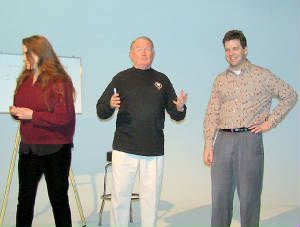
|
| Cal Film Members Christa Bella, Charlie Holliday and Richard Burnsed |
|
 |
|
|
|

